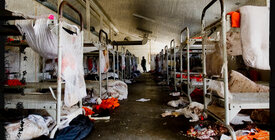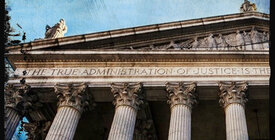This essay is part of the Brennan Center’s series examining the punitive excess that has come to define America’s criminal legal system.
In their essay introducing the Brennan Center series on Punitive Excess, Jeremy Travis and Bruce Western ask readers to question the purpose of punishment. They write, “punishment describes not just what criminal justice institutions do, but also signifies a relationship between the state and its citizens.”
Few aspects of the criminal legal system illustrate that as vividly as the system of monetary sanctions, which requires financial payments from most people who make contact with the criminal legal system. In addition to fines associated with specific offenses, they are charged for their court processing, for DNA testing, for required post-sentencing rehabilitative programs (such as drug and alcohol assessment and treatment), and even in some instances for the costs of incarceration itself. To use Travis and Western’s measure, the relationship between the state and citizen in this country, particularly when the citizen is poor or racialized, is one of control, marginalization, and perpetual punishment.
In most states, all monetary sanctions must be paid in full before a person is released from court supervision. In many states, people are unable to vote until all costs are paid. They must remain in constant communication with court officials about their living and financial arrangements. Not only are monetary sanctions frequently appended to jail or prison time, so are costs associated with probation and other court mandated requirements, such as electronic home monitoring.
Since the 1980s, paralleling the massive growth in convictions and incarceration, state and local jurisdictions expanded the types of fees and fines demanded of people convicted of traffic violations, juvenile offenses, misdemeanors, and felonies. At the same time, the cost to local jurisdictions of the expanding conviction and incarceration rate accelerated as well. As a result, policymakers turned to the very people convicted to pay for the costs of their own processing and punishments. For example, Washington State has a mandatory victim penalty assessment that must be charged for each misdemeanor ($250) and felony ($500) conviction, even if there is no direct victim of the crime in question.
In some states, judges have actually been granted discretion to assess criminal defendants for the cost of a public defender — in other words, an individual who cannot afford to pay a lawyer is expected to pay for the lawyer that the state is constitutionally required to provide. Furthermore, many jurisdictions charge per night in jail or prison. For those too poor to pay, interest, per payment fees, and nonpayment penalties become penal debt that hangs like a cloud over their families’ lives.
Many states also allow cities and counties to engage in contracts with private collection companies, and when debt is transferred to these agencies, additional collection fees are assessed — as much as 50 percent of the principal owed. These public-private debt collection arrangements affect the individuals’ credit scores, limit their employment opportunities, and inhibit their ability to access housing, education, and transportation. The price of services such as telephone calls, electronic communication, video visitation, and health care include kickbacks from the private companies to local jurisdictions — the price the collection agencies pay to win exclusive contracts.
The system of monetary sanctions reinforces our two-tiered system of justice: one for people with financial means and one for people without. Within a society riven by so much inequality, a system of punishment based on economic resources can never be fair or just. This “coerced financialization” perfectly and purposefully places the freedom of poor and racially marginalized people on a perpetual layaway plan. It’s a system so fully embedded in our criminal legal system that the American Rescue Plan Act, passed by Congress in March 2021 to alleviate the financial pains of the Covid-19 pandemic, allowed private collectors and courts to seize the $1,400 stimulus grants from people burdened with unpaid penal debt, either public or private.
Painful consequences
When they are unable to pay penal debt, people entangled with the criminal legal system — already stressed by daily financial choices they must make regarding food, health, and childcare — incur additional legal consequences. In many states, they lose their right to drive; then, if apprehended while driving with a suspended license (even to the job that might enable them to pay their debt), they face renewed incarceration and further financial sanctions.
Consequences accelerate, tethering people to the criminal legal system: not only are people who are behind in their payments sent regular court summonses, but in some instances even those making their monthly payments must regularly report to the court about their employment and living arrangements. This requires many to miss work and to find childcare and transportation (particularly if their driver’s licenses are suspended) just to attend court hearings. When people have been summoned to court but failed to receive notice or chose not to attend out of fear of incarceration, bench warrants are issued for their arrest.
An additional legal consequence related to monetary sanctions is the overpolicing that plagues so many communities of color. Because local governments have come to rely so heavily on revenue generated from fines and fees, traffic citations have become a tool for profit-making. This “pocketbook policing” encourages police to use their authority and discretion to make “pretextual” traffic stops — judgement calls that often involve such things as a faulty taillight, expired license tabs, or an air freshener improperly suspended from the rearview mirror. And when police use their discretion to decide whom they are going to pull over, they pull over Black drivers disproportionately more often than white drivers. Black drivers are consequently searched one and a half to two times more often than white drivers. Costly citations for fines and fees fall most heavily on those least able to pay them. These fines and fees lead to perpetual state surveillance, wealth extraction, and the social control of people who are poor and racially marginalized.
Needed policy reform
Set within the context of the criminal legal system, this system of punishment is nuanced, but it isn’t complicated. Policy implications are clear. In fact, recognizing this system as a purposeful mechanism designed by both policy and statutes allows us to clearly see that it can be dismantled. This set of guiding principles and practices should be established by state and local policymakers and court leadership.
First, statutes must be revised to discontinue monetary sanctions associated with felony convictions. There is no reason that someone sentenced to incarceration should also receive financial penalties, much less be charged daily room and board fees. Fines and fees charged to people who are sentenced to live behind bars, without access to employment and a living wage, are prima facie excessive.
Second, monetary sanctions are also excessive when imposed on children, the unemployed, the unhoused, or those suffering from mental health or chemical addiction disorders. Burdening people who are unable — and who may never be able — to pay fiscal debts is a cruel punishment.
Third, fiscal penalties attached to lower-level offenses that do not call for incarceration, such as traffic violations or misdemeanors, must be calibrated to individuals’ abilities to pay the total sum within, say, two years. Countries around the world rely on day fine systems that calculate a score based on both the severity of the offense and the daily wage of the convicted individual.
Fourth, state and local jurisdictions must discontinue the practice of suspending driver’s licenses related for nonpayment of any court fine and fee and cease issuing warrants related to nonpayment.
Fifth, state and local jurisdictions, along with law enforcement agencies, must review and revise practices related to pretextual traffic stops. Less than one month after the police killing of Daunte Wright in Brooklyn Center, Minnesota, the mayor and city council enacted an ordinance to create a new Department of Community Safety and Violence Prevention. Among other things, this restructuring of police duties transferred the responsibility of traffic enforcement to an unarmed civilian unit.
Finally, states must require all jurisdictions to report (without names attached, to protect individual privacy) all monetary sentences and fees, regularly and systematically, to a state-monitored database. Such data should include amounts collected, amounts waived, means of levy (fine, fee, surcharge, restitution, etc.), and any additional charges imposed related to nonpayment, such as late fees, interest, and collection fees.
The evidence is clear: The American system of monetary sanctions is a purposeful punishment aimed at extracting wealth from individuals, their families and communities — a pound of flesh that many just do not have left to give. It is a system that valorizes those “deserving” of redemption (people with financial means) and stigmatizes those deemed not deserving of redemption (people living in poverty).
Impoverished citizens who are sentenced to monetary sanctions clearly understand their relationship to the state — they are forever indebted, forever subjected to court and police surveillance, control, and punishment. We have alternative punishment and rehabilitative options; we just need the will to make these changes.
Alexes Harris, PhD, is the Presidential Term Professor and professor of sociology at the University of Washington. She is the author of the book A Pound of Flesh: Monetary Sanctions as a Punishment for the Poor.






